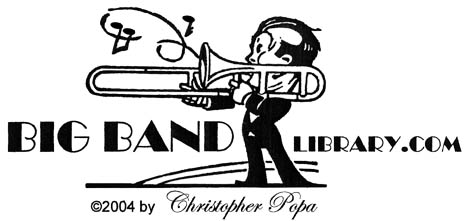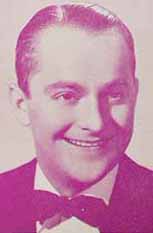
He stopped playing with Lyman's band around 1935, the year that Take Me Back to My Boots and Saddle, a song which he wrote with Leonard Whitcup and Walter Samuels, was recorded by Tommy Dorsey's band. (Their other ditties included If My Heart Could Only Talk and Bewildered, also recorded by Dorsey, and Spring Cleaning, recorded by Fats Waller.)
But Powell evidently was still employed by Lyman, only, as historian-radio host Lloyd Rauch explained, "to secure bands for advertising agency radio contracts."
When Powell did go out on his own to form a big band in 1939, he was willing to commit his savings, hire an agressive press agent, and get underway on a grand scale.
vital stats:
given name Alfred Paolella [ with ASCAP, he went by "Teddy Raymond Powell" ]
birth Mar. 1, 1906, Oakland, CA [ Wikipedia states "March 1, 1905" ]
death Nov. 17, 1993, New York, NY
education San Francisco Conservatory, San Francisco, CA
wife Marguerite James Powell
memberships ASCAP, 1933-
Powell chose some fine players, including Irving Goodman (trumpet), Gus Bivona (clarinet and alto sax), George Koenig (alto sax), Don Lodice (tenor sax), Milt Raskin (piano) and Felix Giobbe (bass), who already had or would go on to make names for themselves in other groups.
One of their first projects seems to have been some Associated transcriptions, made on August 7, 1939, including a swinging Jamaica Jam, arranged by Fred Norman.
After opening at Donahue's Restaurant in Mountainside NJ, they moved into a top spot, The Famous Door in New York City, on September 5th.
Within a few more weeks, they made their first commercial records for Decca, including Teddy's Boogie Woogie, Pussy in the Corner, Flea On a Spree, Some Day, and The
Sphinx, each an original tune that Powell composed with Ben Homer.
So it was a "breeze" after that, right? Not quite, according to Rauch.
"Teddy Powell had proclaimed to the world that he had accomplished in six weeks, what Goodman and Tommy Dorsey took years to achieve," Rauch wrote. "Teddy learned the hard way, for once he left The Famous Door and ventured out into the remote areas of the country he received a mixed response."
Powell reportedly sunk $20,000 into his band during the first six months, and another $15,000 in the six months which followed.
Teddy Powell in his own words:
"I thought with the Famous Door buildup, I'd clean up on one-nighters . . . But I sure learned
a lesson-it can't happen that quick."
"Music Corp. claims they back me as a swing band. Anyway, I'm beginning to wonder if it is
worth having a band full of stars. The stars get too big for you and start telling you what to do."
"But I talk too much . . . I was so thrilled that I said things I never should have said. I'm
convinced that a successful band leader must be a guy who knows when NOT to talk."
"Swing music is not enough for the public. I've half a mind to give up swing all together and turn
my band into a sweet outfit."
Powell stubbornly hung on.
After his band returned to The Famous Door on June 5, 1940, the venue ran into financial trouble. He bided time with the band at Loew's State Theatre that July, and managed to buy The Famous Door so his band could go back to working there. (Historian-producer Frank Driggs noted that "It turned out he was really fronting for his manager Milton Pickman and another silent partner.")
By then the personnel of Powell's band had changed, but there were still good people - as evidenced by the rhythm section: Buddy Weed (piano), Turk Van Lake (guitar), Farnum Fox (bass), and Lou Fromm (drums).
When his Decca contract ended, Powell signed with Bluebird, making at least 70 sides for them between December 1940 and July 1942, including Bluebird Boogie Woogie, Friendly Tavern Polka, Sans Culottes, Serenade to a Maid, and Let's Get Lost.
As shown by his discography, Powell had continued to improve his band's musical fare by programming and recording some very pleasant ballads along with the jazz. In fact, about five of those Bluebird sides made it onto the charts, novelties or ballads which featured Ruth Gaylor or Peggy Mann on vocals. But he never had a hit record otherwise.
In 1941, the band was hired at the Rustic Cabin in Englewood Cliffs, New Jersey, and settled in for a long engagement.
Metronome praised it as the "Surprise Band of the Year."
Unfortunately, that October fire destroyed the Rustic Cabin, taking the band's instruments along with it - but not Powell's determination.
Using his library of original scores which had been safely stored in an office, Powell was able to continue in short time, landing jobs at the Log Cabin in Armonk, NY and a ten-week gig at the Hotel Dixie on W. 42nd St. in New York City.
Sidemen with the band during 1942 included, at various times, Johnny Austin (trumpet), Hal Tennyson or Irving Fazola (clarinet and alto sax), Nick Caiazza (tenor sax), and Chuck Gentry (baritone sax).
They might have made more of an impact, had it not been for World War and a recording ban which took effect in the fall of '42. Although Powell wasn't able to make records, his band performed for various Army and Navy bases, and was heard on quite a number of AFRS "Spotlight Bands" and "One Night Stand" broadcasts.
Surprisingly, Powell himself had been avoiding the draft and was forced to disband when he was accused of making gifts to a clerk to get delays in his induction. In October 1945, Powell pled guilty and was sentenced to fifteen months in prison for "conspiracy to evade military service." He was eligible for parole after serving five months of the sentence.
After Powell was released, the band he led into the early 1950s played sweet, rather than swing.
Around 1953, he gave up the band business altogether and, for the next several decades, worked as a music publisher, with his company Tee Pee Music Co. Inc.
When he passed away in 1993, ASCAP put a small, paid ad in the New York Times, to "record with sorrow" the death of their member.
sources:
Frank Driggs, liner notes, "Teddy Powell and His Orchestra 1942," Circle CCD-132, 1998.
Charles Garrod, Abe Lyman and His Orchestra (Zephyrhills, FL: Joyce Record Club, 1995).
Charles Garrod and Bill Korst, Teddy Powell and His Orchestra (Ze[hyrhills, FL: Joyce
Record Club, 1990).
"Powell, Teddy Raymond" in ASCAP Biographical Dictionary, Fourth Edition (New York
City: Jaques Cattell Press, 1980), p.402.
Lloyd Rauch, liner notes, "Teddy Powell: Ridin' the Subways," Hep ( UK ) CD 1075, 2001.
George T. Simon, "Teddy Powell" in The Big Bands (New York City: The Macmillan
Company, 1967), pp.394-397.
"Teddy Powell," en.wikipedia.org/wiki/Teddy_Powell.
"Teddy Powell Sentenced: Band Leader Gets 15 Months for Plot to Evade Draft," New
York Times, Oct. 10, 1945, p.24.
Joel Whitburn, Billboard Pop Hits: Singles & Albums 1940-1954 (Menomonee Falls, WI:
Record Research, Inc., 2002), p.356.
Bert Whyatt, letter to the editor, "One Sweet Letter: Noddy and Faz," Jazz Journal
International, June 2002.
I would like to expand this tribute with, if possible, a new interview of someone who was important to Teddy Powell's life or career. Are you an alumnus of his band, a member of his family, or a collector who is knowledgeable about his accomplishments? Please contact me via e-mail
return to "Biographical Sketches" directory
go to Big Band Library homepage
The big bands are back
in a new and exciting way!
TEDDY POWELL
"DETERMINED TO SUCCEED"
by Music Librarian CHRISTOPHER POPA
September 2008
He must have been an ambitious person. During his life and career, he got involved in a lot of aspects of the music business, including bandleading, songwriting, and music publishing.
Trained at the San Francisco Conservatory, he was hired around 1927 to play banjo and guitar with Abe Lyman and His California Orchestra. The group was well-known, and he performed in hotels, ballrooms, and theaters, made recordings, and appeared in at least five feature films with them.
